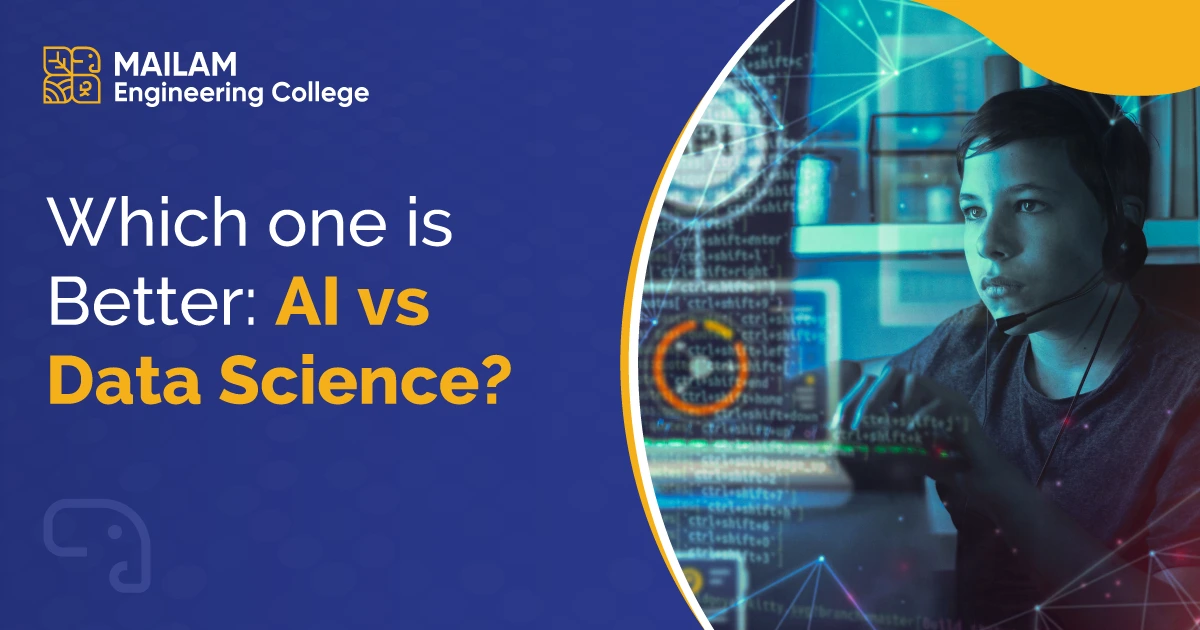Two buzzwords that dominate conversations about the future: Artificial Intelligence (AI) and Data Science. The debate around “AI vs Data Science” has probably caught your attention if you’re a student looking to make the right academic choice or a professional seeking a career switch.
Both fields are redefining how businesses operate, how decisions are made, and how we interact with technology. But which path is better? The answer isn’t straightforward, as each has unique strengths, applications, and future potential. In this blog, we will explore the key differences between AI and Data Science, their scope, skills required, career opportunities, and more.
What is Artificial Intelligence (AI)?
Artificial Intelligence refers to the simulation of human intelligence in machines. These machines are programmed to perform tasks that typically require human cognition, such as understanding language, recognising patterns, solving problems, and making decisions.
At its core, AI focuses on building intelligent systems that can operate independently and improve over time without human intervention. AI is the brain behind self-driving cars, virtual assistants like Siri and Alexa, smart robotics, and even game-playing bots like AlphaGo.
AI can be broadly categorised into:
- Narrow AI (specific tasks like facial recognition)
- General AI (human-like intelligence in any field)
- Super AI (hypothetical level beyond human intelligence)
What is Data Science?
Data Science is an interdisciplinary field that utilises statistical techniques, algorithms, and machine learning to extract meaningful insights from both structured and unstructured data. It combines computer science, mathematics, data analysis, and domain expertise.
While AI tries to mimic human intelligence, Data Science focuses on deriving insights from data to inform decision making. From analysing customer trends in e-commerce to predicting disease outbreaks in healthcare, data science is everywhere.
Core components of Data Science include:
- Data Collection
- Data Cleaning and Preprocessing
- Exploratory Data Analysis (EDA)
- Predictive Modeling
- Data Visualisation
- Business Intelligence
AI vs Data Science: The Core Differences
Although they seem closely related, AI vs Data Science are different in their goals, techniques, and outputs. Here’s a quick comparison:
| Criteria | Artificial Intelligence | Data Science |
| Objective | Simulate human intelligence | Extract insights and make statistical decisions |
| Input | Large volumes of data | Structured & unstructured data |
| Output | Actionable systems (bots, automation) | Predictions, trends, visualisations |
| Tools Used | TensorFlow, Keras, PyTorch | Python, R, Tableau, SQL |
| Skill Focus | Algorithms, Deep Learning, Robotics | Statistics, Data Wrangling, Visualisation |
| Career Roles | AI Engineer, Machine Learning Engineer | Data Scientist, Data Analyst |
In simpler terms, Data Science feeds AI. Without clean, structured data, AI algorithms would lack the training needed to perform well. However, not all Data Science involves AI.
Real World Applications: Where AI and Data Science Shine
Let’s explore how these fields function in the real world:
Applications of Artificial Intelligence
- Healthcare: Diagnosing diseases using AI scans
- Retail: Personalising customer experiences through recommendation engines
- Finance: Fraud detection using real time AI algorithms
- Agriculture: Smart drones for crop monitoring
- Education: Adaptive learning platforms like AI tutors
Applications of Data Science
- Marketing: Customer segmentation and targeting
- E-commerce: Sales forecasting and inventory planning
- Sports: Player performance analytics
- Social Media: Sentiment analysis of posts and trends
- Banking: Credit scoring and risk analysis
Clearly, both AI and Data Science are shaking up industries. The right choice in the AI vs Data Science debate often depends on what kind of impact you want to make.
AI vs Data Science: Career Opportunities
Both fields are flourishing, but the roles and responsibilities differ.
Careers in AI
- AI Engineer
- Machine Learning Engineer
- Robotics Engineer
- Computer Vision Specialist
- Natural Language Processing (NLP) Engineer
These roles involve working on intelligent algorithms, training models, and deploying AI solutions.
Careers in Data Science
- Data Scientist
- Data Analyst
- Business Intelligence Analyst
- Data Engineer
- Statistician
Here, the priority is on interpreting data, spotting trends, and supporting business decisions.
The opportunities are immense, with six-figure salaries and international demand, be it AI or Data Science,.
Skills Required: How to Prepare for Each Field
If you’re a student considering a future in these domains, here’s what you need to focus on.
For AI
- Proficiency in Python or Java
- Strong understanding of Mathematics and Algorithms
- Experience with frameworks like TensorFlow, Keras, OpenCV
- Exposure to Machine Learning and Deep Learning
- Knowledge of Neural Networks, Reinforcement Learning
For Data Science
- Proficiency in Python or R
- Understanding of Statistics and Probability
- Skills in Data Cleaning, Wrangling
- Working with tools like Tableau, Power BI
- Ability to build Predictive Models
AI vs Data Science: Salary Trends
Let’s look at average salary trends in India (approximate figures):
- AI Engineer: ₹10 – ₹25 LPA
- Machine Learning Engineer: ₹8 – ₹20 LPA
- Data Scientist: ₹7 – ₹20 LPA
- Data Analyst: ₹5 – ₹12 LPA
While both paths are lucrative, AI jobs typically demand more niche expertise, hence slightly higher salaries. However, data science roles are more abundant and accessible to entry level professionals.
Future Scope: Which Has a Brighter Tomorrow?
When comparing AI vs Data Science, both fields hold immense promise, but with slightly different trajectories:
AI’s Future
- Growth in autonomous systems, smart robotics, and cognitive automation
- Widespread adoption across manufacturing, healthcare, and defense
- Integration with IoT, 5G, and blockchain
Data Science’s Future
- Central to decision making in all industries
- Increasing demand for data privacy, ethics, and governance
- More user-friendly tools enabling citizen data scientists
Ultimately, AI is about creating intelligent agents, while Data Science is about making sense of information. Choosing between them depends on your interests. Do you enjoy logic heavy programming or analytical storytelling?
AI vs Data Science in Academia: A Message to Students at Mailam Engineering College
At Mailam Engineering College, you’re already a step ahead in this journey. The college offers a practical, interactive learning ecosystem where students are encouraged to explore modern technologies.
With workshops, seminars, hackathons, and collaboration with industries, students can build projects that combine both AI and Data Science, like predictive maintenance systems, AI chatbots, or smart energy grids. Departments such as Computer Science and Engineering and Artificial Intelligence & Data Science offer tailored programs to equip students with the right balance of theory and real-world skills.
If you’re debating AI vs Data Science, know that Mailam Engineering College offers the resources to explore both before you decide.
Final Thoughts: AI vs Data Science – Which One is Better?
There’s no universal winner in the AI vs Data Science debate. The better choice depends on your interests, career goals, and strengths.
- If you’re excited about creating systems that “think”, AI is your domain.
- If you love working with data, identifying patterns, and informing decisions, Data Science is your path.
The truth is: AI and Data Science are two sides of the same technological coin. Data fuels AI. AI enhances data insights. Many successful professionals today are blending both skill sets to create hybrid roles that solve tomorrow’s problems.
FAQs on AI vs Data Science
1. Can a Data Scientist become an AI Engineer?
Yes. With additional training in machine learning algorithms, deep learning, and AI frameworks, a Data Scientist can transition into AI roles.
2. Is AI part of Data Science or vice versa?
AI is a subset of Data Science in many workflows, but technically, they are distinct domains with overlaps.
3. Which one is easier to learn, AI or Data Science?
Data Science is often considered more accessible due to its reliance on statistics and basic programming, while AI demands a strong foundation in algorithms and computing.
4. Are AI and Data Science taught separately at colleges like Mailam Engineering College?
Yes, most colleges now offer dedicated streams, though many encourage interdisciplinary projects involving both.
5. Which has more job opportunities in India: AI or Data Science?
Both fields offer abundant opportunities, but Data Science currently has a broader range of roles across industries like finance, retail, healthcare, and telecom. However, AI roles are growing rapidly, especially in sectors focusing on automation, robotics, and intelligent systems.







